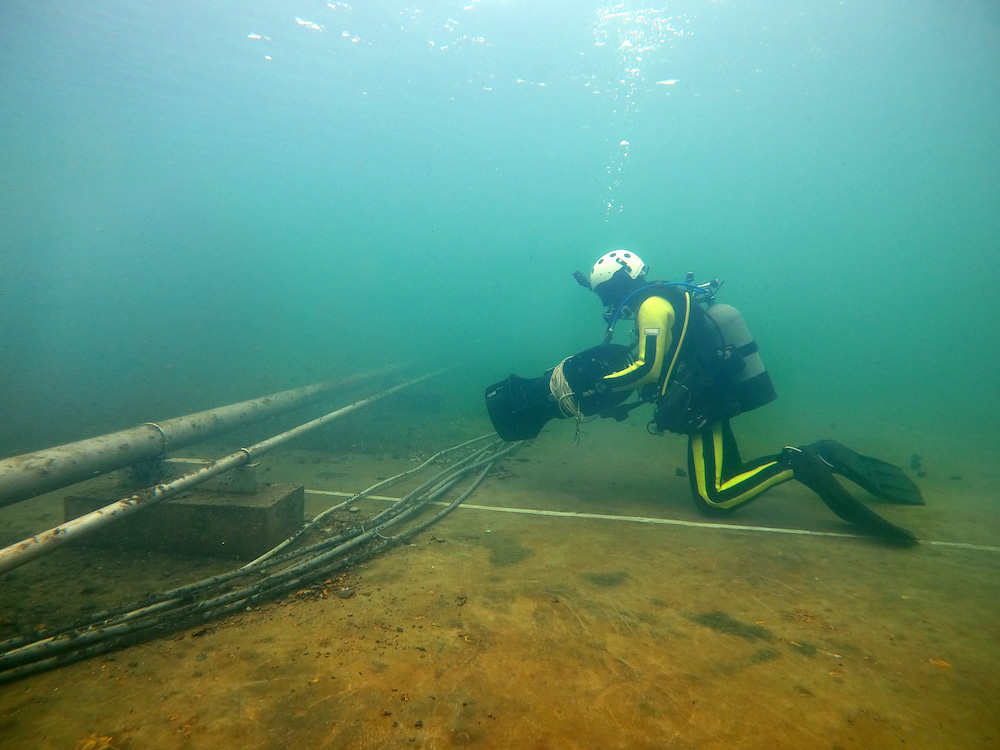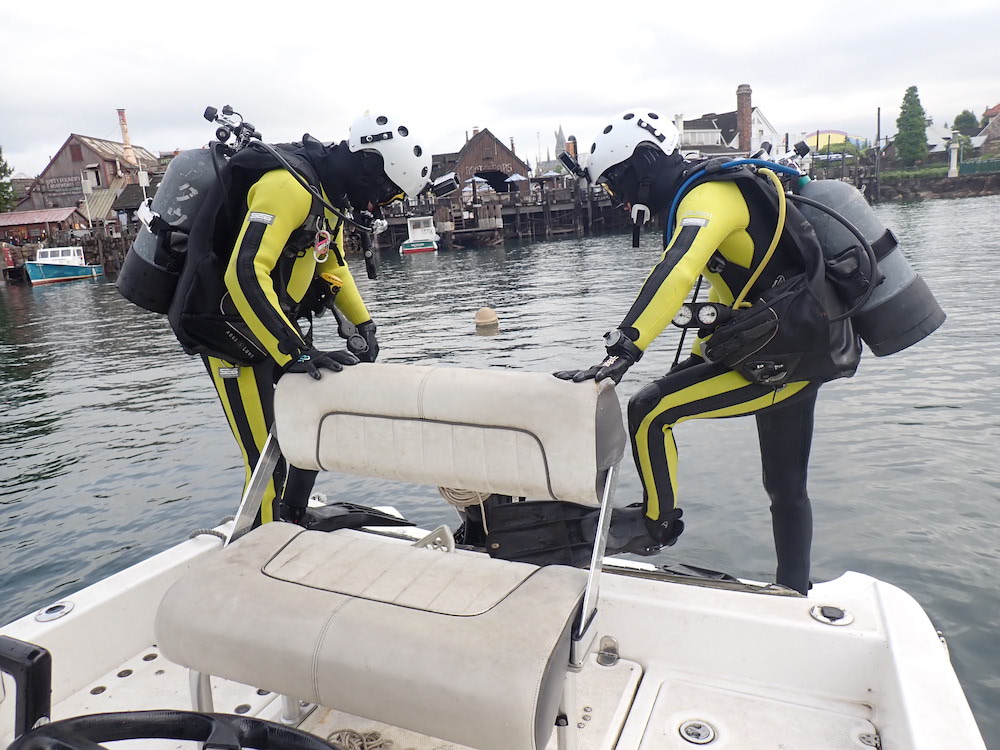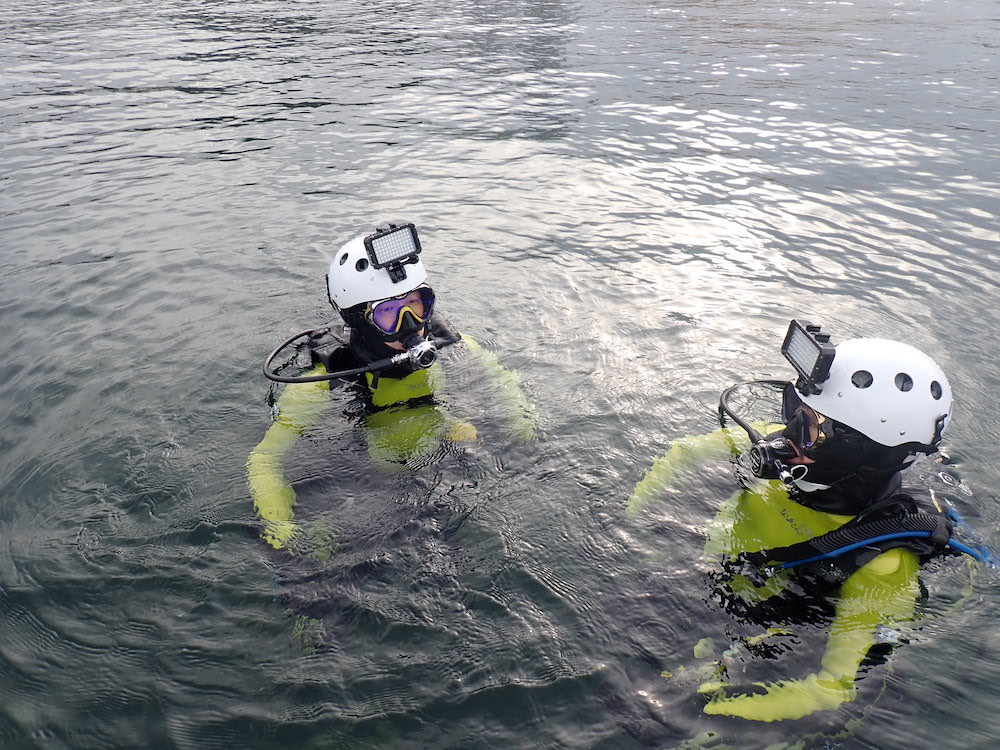What comes to your mind when you hear the phrase “a job that involves diving in the ocean”? Perhaps diving guides and the Japan Coast Guard immediately come to mind. However, the work that divers do in the ocean and other bodies of water actually covers a wide range of things, from supporting our infrastructure to surprising things like, “Did they even do that?!” This series is a project that focuses on the unknown, behind-the-scenes protagonists who are involved in such sea and waterside work as divers.
This time we interviewed a diving team from Universal Studios Japan (hereinafter referred to as the Park), a theme park in Osaka Prefecture that you may have visited at least once. We would like to ask Mr. Koji Yamada (hereinafter referred to as Mr. Yamada), who is the leading authority in starting up the park’s diving team, about his reasons for starting the diving team and what little-known activities he does.
What are divers doing at Universal Studios Japan?
Editorial Department (hereinafter referred to as ——): First of all, what kind of work do divers do at the park?
Mr. Yamada: There are two main types of work. Lagoon (*1)dredgingdredgingwork (*2), collecting fallen objects from the lagoon, and rescuing fallen people.
To put it simply, lagoon dredging involves collecting algae that forms at the bottom of the lagoon before it can be seen by guests. The 2m deep lagoon is filled with fresh water, but algae naturally grows on the bottom of the lagoon. This algae photosynthesizes, stores oxygen, grows, and eventually floats all over the lagoon. This is also a considerable amount.
In order to maintain the beautiful appearance of the lagoon, we cut the algae before it floats up, collect it in one place, and use a hose to suck it up into a dredging boat. We do this work five times a week, starting at around 5 a.m. before we welcome guests, and completing the work for about 1.5 to 2 hours before the park opens.

Mr. Yamada: Collection of fallen items in the lagoon involves collecting items dropped by guests into the lagoon and handing them over to the guests. As expected, most of the falling objects are cell phones, but other items such as shoes and rings are also lost. In the past, when I tried to present a wedding ring on a deck with gaps, it fell off. If they are large, they can be caught from the boat with a hand catcher, but if they are small, they have to go underwater and grope for them, so it is sometimes difficult to find them. In order to quickly find fallen objects, it is important to collect algae during dredging and keep the area clean at all times.


Mr. Yamada: When it comes to rescuing people who have fallen into the water, there are rare occasions when a guest falls into the water for some reason, and in such cases, a rescue boat is sent out to quickly rescue people. Other duties include maintaining dredging boats and rescue boats and repairing concrete joints.
——What is the most difficult task?
Mr. Yamada: It’s dredging work. The work requires patience and concentration, as teams of two people use spatulas to scrape away algae from the entire bottom of a wide lagoon, creating water currents to collect the algae and sucking it all up all at once.
——It’s hard to imagine, but they work silently, facing the algae intently.
*1: A large lagoon (pond) located almost in the center of the park. This is a place that can be seen from all areas of the park, and is also where shows are held.
*2: Construction work that excavates the earth and sand from the bottom of rivers, ports, etc.
▶︎Click here for detailed job details (recruitment page)
What is the reason for forming the “Professional Diving Group”?
——I heard that a “diving team” is responsible for the dredging of the lagoon, the collection of fallen objects in the lagoon, and the rescue of people who have fallen into the lagoon. Could you please tell me why this diving team was formed?
Mr. Yamada: Before the diving team was formed, there were “ship operation” operations, such as operating rescue boats, and “lagoon management” operations, which involved dredging, and these duties were carried out by a separate section of the attraction. However, the Logistics Section (*3) to which I belong is the one closest to the lagoon in the center of the park and is available 24 hours a day, so I have a boat license, diving qualification, and diver’s license in this section. If we gather a team of boat handling and diving specialists with the same skills, wouldn’t we be able to always provide a clean lagoon? That’s what led me to form a diving team. The lagoon felt like an attraction, and we wanted to impress the guests. Currently, about three years have passed since the group was formed, and the team has five members, and recently the number of young staff in their 20s and 30s has gradually increased.
——I see. It’s a diving team formed within the logistics section. Do you have any future goals?
Mr. Yamada: Currently, there are attractions other than lagoons that use water (Jurassic Park, Waterworld, Jaws, etc.), but management is handled by divers who belong to each attraction’s section separately from our diving team. . I think that if we could gather all these divers together and supervise the waterfront area in the park, we would be able to improve both technologically and safety-wise.
*3: A section that manages various parts and materials necessary for maintenance of attractions, shows, facilities, etc. When not engaged in diving work, we also perform incoming inspections and warehousing and unloading work at logistics offices and external warehouses.
A rewarding experience unique to being the driving force behind Universal Studios Japan
Mr. Yamada: Although I belong to the logistics section, I believe that the professionalism and motivation of the team members are kept high by performing diving work as a “diving team.” Dredging work is particularly hard work, but the more you clean it, the more the lagoon becomes visibly cleaner, and when guests and crew members see it and say, “The lagoon has become so much cleaner,” it’s the best feeling ever. It feels very rewarding.
——After all, everyone notices how beautiful the lagoon is. It’s rewarding to think that the lagoon in the center of the park gives guests a soothing and extraordinary feeling.
Mr. Yamada: That’s right. Also, when collecting fallen items, you will be working right in front of the guests, so when you can return a ring or something important to them, the guests will be really happy, just seeing them do it. This also makes me very happy.
In the future, I would like to contribute to ocean conservation.
——I heard that the diving team is thinking about contributing not only to the park, but also to the local community, such as ocean conservation.
Mr. Yamada: Yes, when we established the diving team, we were thinking of creating a team that would eventually be able to engage in such activities. Guests visit the park from all over the world, so we want to create an environment where they can see the Osaka sea and think it’s beautiful. The place where the park is located is also a place where the sea is being reclaimed.
——It’s not just the park, but the entire ocean in Osaka.
Mr. Yamada: I agree. Universal Studios Japan is only possible because of the understanding of the local community, so for example, we have a “Children’s Cafeteria” that provides free meals to children, and we have universities come to give lectures on tourism at Universal Studios Japan. We have carried out community contribution activities centered on supporting local children, such as inviting children with incurable diseases to the park. However, we have not yet started in areas related to the ocean, such as marine conservation, so we hope to expand our efforts to contribute to the local community through activities such as seabed cleaning and seaweed bed restoration activities in Osaka Bay. Masu.
——I would like to collaborate with ocean+α to help preserve the ocean. Thank you very much, Mr. Yamada.
Next time you go to Universal Studios Japan, be sure to pay attention to the lagoon. You can clearly see the efforts of the diving team, which was formed based on Mr. Yamada’s desire for guests to enjoy the lagoon as one of the attractions. As a theme park with close ties to the local community, we would like to continue to follow the activities of the diving team.
